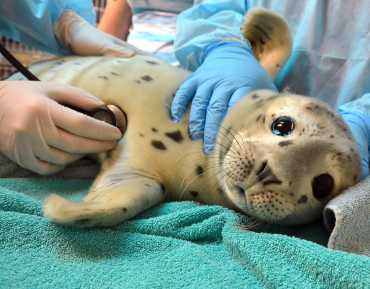
Center Responds to Humpback Whale Amid COVID-19 Pandemic
The Marine Mammal Center Responds to Humpback Whale at San Francisco’s Baker Beach Amid COVID19 Pandemic
A team of scientists from The Marine Mammal Center, the world’s largest marine mammal hospital, and its partners, responded to a humpback whale that washed ashore last week on San Francisco’s Baker Beach. Due to the animal’s advanced state of decomposition, the team was unable to determine a conclusive cause of death.
The Center has had to make significant changes to its whale necropsy response efforts amid the COVID-19 pandemic to ensure the health and safety of its first responders while still attempting to gather critical data.
“The ongoing COVID-19 pandemic has greatly impacted our marine mammal response capabilities as we prioritize the health of our experts to allow these invaluable investigations to safely continue,” says Dr. Pádraig Duignan, Chief Research Pathologist at The Marine Mammal Center. “Whale necropsies are critical to provide insights into the overall health of these animals and their ocean environment, including human activity that can impact them. We are committed with our partners to utilize smaller teams of experts to continue to provide data and find solutions to prevent these deaths in the future.”
Whale necropsies are critical to provide insights into the overall health of these animals and their ocean environment, including human activity that can impact them.
The Center and its partners are currently deploying response teams with less than a third of normal personnel for shorter durations and with increased personal protective equipment to safely continue this important work. This necessary action has led to a decrease in data and sample collection during necropsies which can make it more difficult to determine why a whale stranded.
These impacts played a role in the April 21, 2020, response to a juvenile female humpback whale at San Francisco’s Baker Beach by scientists from the Center and its partners at the California Academy of Sciences. Due to the reduced staffing and the whale’s poor body condition, scientists were unable to determine the cause of death for the 37-foot whale. Experts evaluated available tissues and viable samples from the partial necropsy thoroughly over the past week prior to concluding their findings.
In recent years, blunt-force trauma from ship strikes, malnutrition and entanglements are the most common causes of death in whales The Marine Mammal Center’s research team has investigated.
During the necropsy on the beach, the team encountered a number of people not following CDC mandates for social distancing, many of whom were not wearing a mask. This is not only of particular concern because of the pandemic, but also because scientists use long, sharp knives and tools during a necropsy. It is critical for the public to maintain their distance and keep their pets away if they encounter a necropsy or marine mammal rescue in progress, for everyone’s safety.
“As we investigate why a whale has died, we ask people to please keep their distance from the whale and our response teams so they can complete as much of the necropsy as possible,” said Dr. Duignan. “This is especially important given the current shelter-in-place orders and to prevent potential disease transfer from the animal to people or their pets.”
Officials from Golden Gate National Recreation Area buried the whale’s remains at Baker Beach late last week. Please report sick and injured marine mammals to The Marine Mammal Center at 415-289-SEAL (7325).
For more information or to set up an interview on this topic, please contact us at media@tmmc.org.
Yes, I want to save a life!

Yes, I want to save a life!
You’ll be giving sick and injured animals the best possible care at the Center’s state-of-the-art hospital. With your gift today, you are giving a patient a second chance at life in the wild.
See Our Latest News
{"image":"\/Animals\/Wild\/Gray whale\/cropped-images\/two-gray-whales-golden-gate-bridge-shutterstock-0-0-1270-992-1770234810.jpg","alt":"two gray whales under the Golden Gate Bridge","title":"The Marine Mammal Center and San Francisco Harbor Safety Committee Pilot New Vessel Operator Training Program","link_url":"https:\/\/www.marinemammalcenter.org\/news\/the-marine-mammal-center-and-san-francisco-harbor-safety-committee-pilot-new-vessel-operator-training-program","label":"Press Release","date":"2026-02-06 01:00:00"}

The Marine Mammal Center and San Francisco Harbor Safety Committee Pilot New Vessel Operator Training Program
February 6, 2026
Read More{"image":"\/Animals\/Wild\/Bottlenose dolphin\/cropped-images\/dolphinphoto-by-adam-li-c-noaa-0-0-1270-992-1769539954.jpg","alt":"A bottlenose dolphin jumps out of the water.","title":"What\u2019s the Difference Between Dolphins and Porpoises? And Other Animal Trivia","link_url":"https:\/\/www.marinemammalcenter.org\/news\/whats-the-difference-between-dolphins-and-porpoises-and-other-animal-trivia","label":"News Update","date":"2026-01-26 23:00:00"}

What’s the Difference Between Dolphins and Porpoises? And Other Animal Trivia
January 26, 2026
Read More{"image":"\/Animals\/Patients\/Sea otters\/2025\/cropped-images\/so-mooring-release-2-laurie-miller-c-the-marine-mammal-center-USFWS-permit-MA101713-1-147-8-1270-992-1770307740.jpg","alt":"Sea otter - Mooring","title":"Rescue Stories: Southern Sea Otter Mooring Named the 2025 Patient of the Year","link_url":"https:\/\/www.marinemammalcenter.org\/news\/rescue-stories-vote-for-your-favorite-marine-mammal-patient-of-2025","label":"News Update","date":"2026-01-16 10:05:08"}

Rescue Stories: Southern Sea Otter Mooring Named the 2025 Patient of the Year
January 16, 2026
Read More{"image":"\/People\/Action\/Veterinary care\/cropped-images\/Harris_Green turtle_TMMC-0-0-1270-992-1767649941.jpg","alt":"Heather Harris","title":"Seattle Aquarium Awards Dr. Heather Harris With Prestigious Conservation Research Award","link_url":"https:\/\/www.marinemammalcenter.org\/news\/seattle-aquarium-awards-dr-heather-harris-with-prestigious-conservation-research-award","label":"In the News","date":"2026-01-05 04:48:00"}

Seattle Aquarium Awards Dr. Heather Harris With Prestigious Conservation Research Award
January 5, 2026
Read More